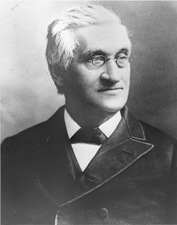Charles Van Wyck
Charles Henry Van Wyck ( May 10, 1824 in Poughkeepsie , New York , † October 24, 1895 in Washington, DC ) was an American politician of Dutch descent who was a member of the United States House of Representatives from 1859 to 1863 and 1867 to 1871 from New York and was a United States Senator from Nebraska from 1881 to 1887 .
Early years
Charles H. Van Wyck was born on May 10, 1824 in Poughkeepsie to Theodore C. and Elizabeth Mason Van Wyck. He attended Rutgers College in New Jersey , studied law and was admitted to the bar in 1847. He then practiced his profession in Bloomingburg , New York, where he was appointed District Attorney . He held this position between 1850 and 1856.
Political and military advancement
Politics in New York
In 1858, Van Wyck was elected a Republican to the United States House of Representatives. He served two terms from March 4, 1859 to March 3, 1863. He was chairman of the Committee on Mileage and Committee on Revolutionary Pensions .
Civil War
In 1863, during the Civil War , Van Wyck enlisted in the Union Army , where he commanded the 56th regiment of the New York Volunteer Units as Colonel . Most of the time he served near Charleston , South Carolina under General McClellan . He was involved in the Battle of Williamsburg and the Battle of Seven Pines , among others . In September 1865 he was awarded the brevet rank of Brigadier General .
Back in New York, Van Wyck was re-elected to the House of Representatives for two terms, where he served between March 4, 1867 and March 3, 1871. On September 15, 1869, Van Wyck married Kate Brodhead in Washington DC
Politics in Nebraska
As early as 1857, Van Wyck had bought land in western Kansas and Nebraska as part of an entirely family-owned investment firm. In addition to his main land holdings in Otoe County , he also owned other lands in Thayer and Fillmore Counties . In 1874 he moved entirely to Nebraska. A year later he took part in the Constituent Assembly of Nebraska. From 1877 on, Charles Van Wyck held the office of State Senator for six years, and in 1881 he was sent as a Senator from Nebraska to the United States Senate in Washington DC. There he was chairman of the Committee on the Mississippi River and Its Tributaries from 1881 to 1883 . His policy was characterized by an anti-monopoly attitude and a rejection of what he saw as the arbitrary influence of the politically active railway companies. This attitude alienated him from his party, the Republicans, whose policies he ultimately even publicly opposed. He held his office as a US Senator until March 3, 1887, when his predecessor Algernon Sidney Paddock moved back into the Senate. From 1890 Van Wyck was a supporter of the newly founded Populist Party , but failed in the election as governor of Nebraska in 1892.
death
He eventually ended his political career and moved to Washington DC, where he died on October 24, 1895 in the presence of his wife Kate and daughter H. Theodora Van Wyck. His funeral took place in Milford , Pennsylvania , where his deceased daughters Meta, Lilly and Louise are also buried.
Web links
- Charles Henry Van Wyck's speech, True Democracy - History Vindicated , delivered to the House of Representatives on March 7, 1860
- Charles Henry Van Wyck's speech Despotism and Slavery , delivered on June 16, 1860 in the House of Representatives
- Charles Van Wyck in the Biographical Directory of the United States Congress (English)
- Charles Van Wyck in the database of Find a Grave (English)
Individual evidence
- ^ Jack D. Welsh: Medical Histories of Union Generals , 2005, Kent State University Press, p. 351, ISBN 978-0-87338-853-5 (online via Google Books)
- ^ Charles Henry Van Wyck on the Nebraska State Historical Society website
- ↑ Nebraska elects Gen. Van Wyck , New York Times article, January 23, 1881
- ↑ Extorsions by Railways , article in The New York Times of January 17, 1885
- ^ Opposed by the Railroads , New York Times article, Jan. 13, 1887
- ↑ Mixed Politics in Nebraska , New York Times article, April 28, 1890
- ↑ Mr. Paddock Chosen Senator New York Times article, Jan. 22, 1887
- ^ Ex-Senator Van Wyck Dead , New York Times article, October 25, 1895
| personal data | |
|---|---|
| SURNAME | Van Wyck, Charles |
| ALTERNATIVE NAMES | Van Wyck, Charles Henry (full name) |
| BRIEF DESCRIPTION | American politician |
| DATE OF BIRTH | May 10, 1824 |
| PLACE OF BIRTH | Poughkeepsie |
| DATE OF DEATH | October 24, 1895 |
| Place of death | Washington, DC |



